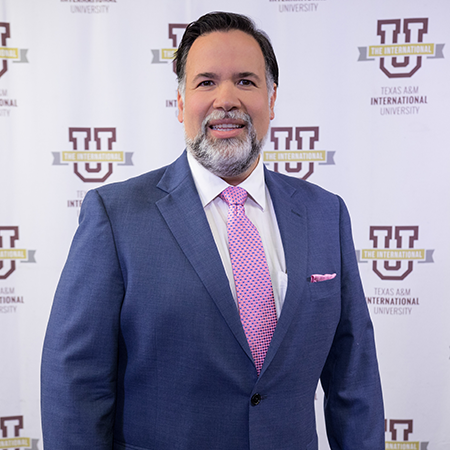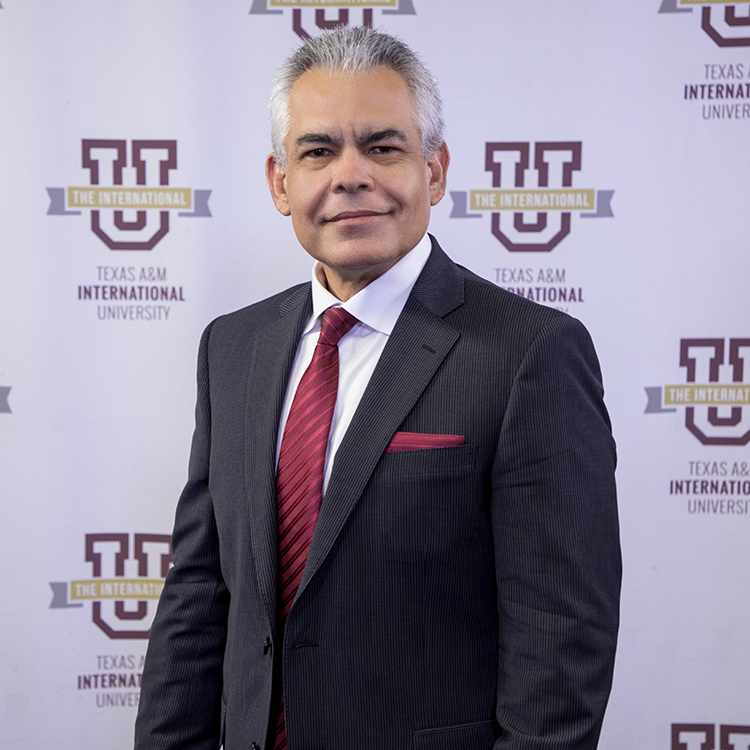TAMIU’s Dr. Covarrubias Addresses North American Economic Competitiveness Across Three Strategic Forums

Dr. Daniel Covarrubias, director of Texas A&M International University’s (TAMIU) A.R. Sanchez, Jr. School of Business Texas Center for Border Economic and Enterprise Development, participated in three high-profile national forums addressing North American economic integration and competitiveness between June 13 - 19, 2025.
The speaking engagements included a Washington International Trade Association (WITA) webinar on USMCA and North American Strategic Competitiveness (June 13), a keynote presentation at Reliance Partners’ 8th Annual Modernization of Cross-Border Trade event at the Laredo Country Club (June 17), and a panel discussion on tariffs and economic policy at the ReMA Gulf Coast Region Convention at the JW Marriott San Antonio Hill Country Resort (June 19).
Reimagining Security and Prosperity as Complementary Forces
At the Reliance Partners event, Dr. Covarrubias delivered the opening keynote presentation, “Reimagining North American Economic Integration." He challenged the conventional approach that treats security and prosperity as competing priorities, presenting economic data demonstrating the cost of this false choice to a packed room of over 500 industry leaders.
“Uncertainty alone costs the North American economy $45-75 billion annually, more than many tariffs themselves,” Covarrubias told attendees, “The Texas Center recently identified over 8.4 million jobs in the United States and México that depend on integrated supply chains built over 30 years. Security IS North America’s new subsidy. Every dollar kept continental reduces global risk.”
The presentation resonated strongly with industry leaders, with multiple attendees asking how they could help advance these concepts as North America approaches the 2026 USMCA review.
“The message was clear: this isn’t just about policy. It’s about building momentum for a vision of North American integration that works for everyone,” Covarrubias noted.
Addressing Regional Competitiveness Challenges
During the WITA webinar, Covarrubias joined an expert panel including Glenn Hamer (Texas Association of Business), Meredith Lilly (Carleton University), Joshua Meltzer (The Brookings Institution), and Cesar Remis to explore how North America can become the world’s most competitive economic bloc. The discussion focused on strengthening supply chain resilience, leveraging USMCA to boost American competitiveness, and building a unified approach to global economic challenges.
Drawing from his work at the Texas Center, Covarrubias emphasized how strategic alignment can transform border communities into economic powerhouses.
“From our research, we’ve seen firsthand that the USMCA isn’t just a trade agreement; it’s a blueprint for regional prosperity,” he observed.
Economic Impact of Trade Policies
At the ReMA Gulf Coast Region Convention in San Antonio, Covarrubias participated in a panel titled “The Effects of Tariffs on Commodities, Business, and the Economy” alongside Dr. Belinda Román from St. Mary’s University and Marlon K. Scott from Wealth Standard Financial. The panel, moderated by Blake Hurtik from Argus Media, examined how trade policies impact various economic sectors.
Covarrubias connected the discussion to broader themes of North American integration, emphasizing that trade policy decisions must consider their continental implications.
“As we face shifting global supply chains and growing international competition, North America’s response must be coordinated and strategic,” he explained.
Looking Toward USMCA 2.0
Across all three forums, Covarrubias consistently highlighted the approaching 2026 USMCA review as a critical opportunity for North American economic integration.
“USMCA 2.0 needs to be more than a trade agreement. It needs to be a blueprint for continental competitiveness,” he emphasized.
The presentations built upon themes from Covarrubias’s recent work on Smart Borders, digital transformation in cross-border logistics, and institutional innovations such as the Binational Customs Agency and the North American Industrial Coordination Council concepts. His research demonstrates that unified approaches to customs processing and joint economic coordination can enhance security and efficiency while driving shared prosperity.
For more information about Dr. Covarrubias’s work or TAMIU’s Sanchez School Texas Center research initiatives, please visit http://texascenter.tamiu.edu, email Dr. Covarrubias at dcova@tamiu.edu, or call 956.326.2520.

